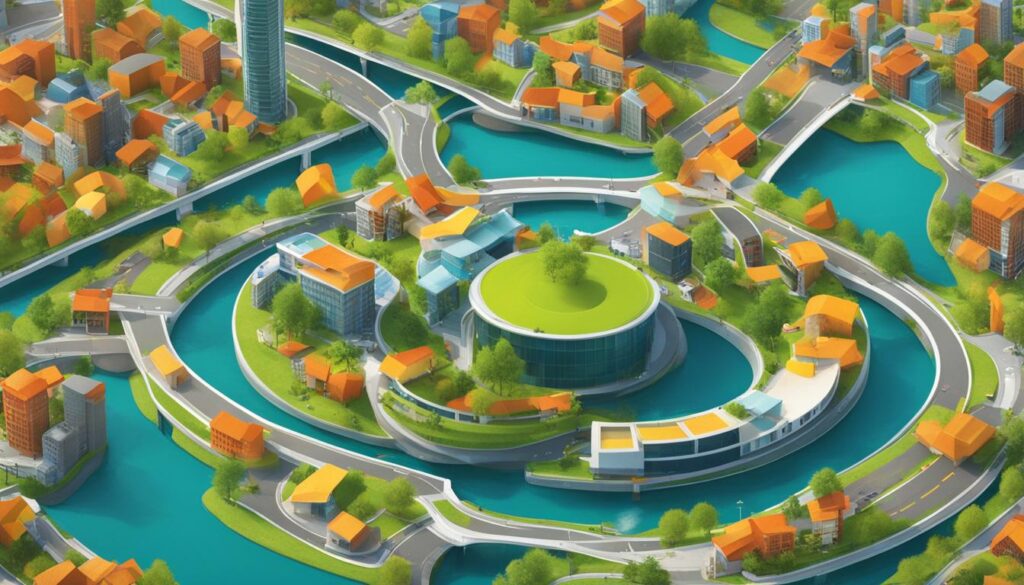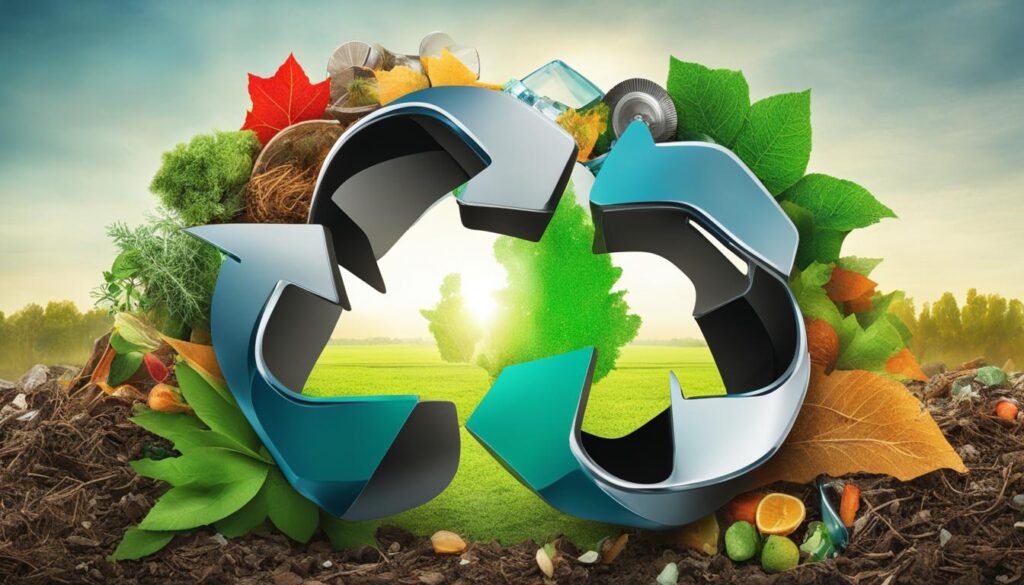The zero waste movement is revolutionizing our approach to waste management and sustainability. By embracing zero waste tech and innovative solutions, we can create a more eco-friendly future. Sustainable technology is at the forefront of this movement, offering waste reduction solutions that promote a circular economy and minimize our environmental impact.
Zero waste tech encompasses a wide range of advancements, from smart waste management systems to eco-friendly innovations. These technologies not only help us manage waste more efficiently but also contribute to a greener and healthier planet. By adopting zero waste solutions, we can pave the way for a more sustainable future.
Key Takeaways:
- Zero waste tech is a growing trend that aims to eliminate waste from our society.
- Sustainable technology offers waste reduction solutions and promotes a circular economy.
- Embracing zero waste can lead to a more eco-friendly future.
- Smart waste management systems and eco-friendly innovations are driving the zero waste movement.
- Adopting zero waste solutions can create a greener and healthier planet for future generations.
How Zero Waste Implements Circular Economy Concepts
The zero waste movement and the circular economy share the common goal of reducing waste and minimizing environmental impact. However, they approach waste management from slightly different angles. The zero waste movement focuses on a hierarchy of waste management strategies, including rethinking and redesigning products, reducing consumption, and promoting reuse and recycling.
“The zero waste movement aims to completely eliminate waste from our society by keeping products and materials in use for as long as possible and regenerating natural systems.”
On the other hand, the circular economy takes a more holistic approach by designing closed-loop systems that promote the circularity of resources and minimize waste and pollution. It focuses on keeping products, components, and materials at their highest utility and value at all times, creating a more sustainable approach to waste management.
While both concepts have their unique strengths, there is an opportunity for the zero waste movement to benefit from adopting even greater circularity. By integrating circular economy principles, such as designing for longevity and promoting resource recovery, the zero waste movement can achieve its goals more effectively and create a stronger impact in waste reduction and management.
How Zero Waste Implements Circular Economy Concepts
| Zero Waste Movement | Circular Economy |
|---|---|
| Focuses on waste hierarchy strategies | Designs closed-loop systems |
| Promotes reuse and recycling | Minimizes waste and pollution |
| Reduces consumption | Keeps products at highest utility and value |
| Rethinks and redesigns products | Promotes resource recovery |
By combining the strengths of the zero waste movement and the circular economy, we can create a more sustainable future and drive greater efficiency in waste management. Together, these concepts have the potential to transform our society into one that is truly circular, where waste is minimized, resources are conserved, and the environment is protected for future generations.

The Benefits of Combining Zero Waste Tech with Circular Economy Principles
The zero waste movement has made significant strides in promoting waste reduction and sustainability. However, by embracing circular economy principles, the movement can further improve its effectiveness and make a greater impact. Integrating circular economy concepts into zero waste practices can enhance eco-friendly innovation and provide holistic waste reduction solutions.
Creating Truly Sustainable Products
Adopting a more rigorous circular approach can ensure that products labeled as “zero waste” address all aspects of waste generation and future impacts. This helps avoid greenwashing and guarantees that products are genuinely sustainable. For example, rather than simply replacing plastic with bamboo in toothbrushes, a circular approach would involve designing toothbrushes with interchangeable heads or promoting the use of naturally grown chewing sticks. By implementing circular economy principles, the zero waste movement can develop products that minimize waste and maximize resource efficiency.
Promoting Reusable Alternatives
The zero waste movement can leverage circular economy principles to encourage the use of reusable alternatives and reduce single-use consumption. By promoting the use of bulk dispensers and refillable containers in supermarkets, for instance, the movement can reduce packaging waste. A circular approach emphasizes designing closed-loop systems and focuses on extending the lifespan of products, components, and materials. By integrating circularity into zero waste practices, reusable alternatives can become more accessible and mainstream, driving significant waste reduction.
| Benefits of Combining Zero Waste Tech with Circular Economy Principles |
|---|
| Creation of truly sustainable products |
| Promotion of reusable alternatives |
| Enhanced waste management efficiency |
Enhanced Waste Management Efficiency
The circular economy emphasizes keeping materials in use for as long as possible. By embracing circular economy principles, the zero waste movement can develop innovative waste management solutions that optimize resource utilization and minimize waste generation. Implementing smart waste management technologies, such as IoT-enabled waste bins and AI-assisted waste sorting systems, can streamline the waste management process, improve recycling rates, and reduce overall environmental impact. By combining zero waste tech with circular economy principles, waste management practices can become more efficient and effective, leading to greater waste reduction.
The synergy between zero waste tech and circular economy principles offers immense potential for waste reduction, eco-friendly innovation, and a more sustainable future. By embracing circularity and incorporating circular economy concepts into zero waste practices, businesses, individuals, and communities can make a significant positive impact on the environment and contribute to building a greener world for future generations.

The Future of Zero Waste
The future of zero waste is bright and promising, as the movement continues to gain momentum and evolve. By embracing circular economy principles, the zero waste movement can enhance its impact and drive greater efficiency in waste management. This integration of circularity as the foundation for a sustainable economy is key to achieving long-term environmental sustainability.
One of the ways the future of zero waste can be realized is by further adopting sustainable practices and technologies. Zero waste tech solutions that focus on waste reduction and resource recovery have the potential to revolutionize the way we manage waste. By implementing innovative technologies, such as smart waste management systems and advanced recycling processes, we can significantly reduce waste generation and increase recycling rates.
“The future of zero waste lies in embracing circularity as the foundation for a truly sustainable economy.”
A circular economy approach can also drive eco-friendly innovation, leading to the development of more sustainable products and materials. By rethinking and redesigning products to be more durable and easily repaired, we can extend their lifespan, reducing the need for constant consumption and disposal. Additionally, promoting the use of reusable alternatives and incorporating circular economy principles into manufacturing processes can further minimize waste and environmental impact.
Smart Waste Management: Shaping a Sustainable Future
Smart waste management is revolutionizing the way we handle waste, paving the way for a more sustainable future. By leveraging technology and innovative solutions, we can optimize waste collection, improve recycling rates, and reduce the environmental impact of waste.
One key aspect of smart waste management is the use of Internet of Things (IoT) devices, such as smart waste bins. These bins are equipped with sensors that monitor waste levels in real-time, allowing municipalities and waste management companies to optimize collection schedules and reduce unnecessary trips. This not only saves time and resources but also minimizes carbon emissions from waste collection vehicles.
In addition to smart bins, AI robots are being deployed in recycling centers to efficiently sort waste and separate recyclable materials from non-recyclable ones. These robots use advanced algorithms and machine learning to identify and sort different types of waste, improving the overall efficiency of recycling processes.
| Benefits of Smart Waste Management | Examples of Smart Waste Management Technologies |
|---|---|
|
|
“Smart waste management utilizes technology to streamline waste collection, monitor waste levels, and improve recycling rates. By optimizing the waste management process, we can reduce our ecological footprint and create a more sustainable future.”
Furthermore, the integration of pneumatic waste pipe systems can transport waste directly to processing centers, eliminating the need for traditional waste collection vehicles. This reduces traffic congestion and pollution associated with waste transportation, and ensures a more efficient and environmentally friendly waste management process.
Smart waste management also extends to electronic waste (e-waste) through the use of e-waste kiosks. These kiosks allow individuals and businesses to conveniently and responsibly dispose of their electronic devices. By encouraging proper disposal and recycling of e-waste, we can recover valuable resources and minimize the negative environmental impact of electronic waste.
Driving Sustainability Through Innovation
Recycling apps have emerged as a powerful tool in promoting sustainable waste practices. These apps provide individuals and businesses with information on local recycling options, making it easier to find recycling centers, understand recycling guidelines, and promote a circular economy by ensuring that materials are properly recycled and repurposed.
Smart waste management technologies are shaping a sustainable future by optimizing waste collection, improving recycling rates, and reducing the environmental impact of waste. By embracing these innovations and integrating them into waste management systems, we can work towards a zero waste future and create a greener and healthier planet for generations to come.

Conclusion
The zero waste movement, coupled with the implementation of smart waste management technologies, is paving the way for a sustainable future. By integrating circular economy principles, we can enhance the impact of the zero waste movement and drive greater efficiency in waste management.
Companies such as Subaru, Unilever, and Google are leading the way in achieving zero waste to landfill, demonstrating that sustainable practices are feasible across various industries. Moreover, companies like RTS and TerraCycle are providing innovative solutions and support for businesses and consumers pursuing zero waste goals.
As technology continues to advance, it offers opportunities for even more innovative waste reduction solutions and greater resource efficiency. With concerted efforts from individuals, businesses, and governments, we can make a zero waste future a reality, creating a greener and healthier planet for future generations.
FAQ
What is the zero waste movement?
The zero waste movement is a growing trend that aims to completely eliminate waste from our society by rethinking products, reducing consumption, reusing materials, recycling and composting, recovering materials, and managing residuals.
What is the circular economy?
The circular economy is an approach that focuses on designing out waste and pollution, keeping products and materials in use for as long as possible, and regenerating natural systems. It aims to create closed-loop systems that promote resource circularity and minimize waste and pollution.
How do the zero waste movement and circular economy relate?
Both concepts share the goal of reducing waste and minimizing environmental impact. The zero waste movement focuses on waste management strategies, while the circular economy takes a more holistic approach by designing closed-loop systems. They can complement each other to drive greater sustainability in waste management.
How can the zero waste movement benefit from the circular economy?
By adopting circular economy principles, the zero waste movement can ensure that products labeled as “zero waste” address all aspects of waste generation and future impacts. Integrating a more rigorous circular approach can also help avoid greenwashing and promote truly sustainable practices.
How can the zero waste movement leverage circular economy principles?
The zero waste movement can leverage circular economy principles by promoting reusable alternatives, encouraging the use of bulk dispensers and refillable containers, and designing products with interchangeable parts. This promotes waste reduction and resource circularity.
What is smart waste management?
Smart waste management refers to the use of technology to make the waste management process more efficient, environmentally friendly, and sustainable. It utilizes technologies like the Internet of Things (IoT) to streamline waste collection, monitor waste levels, and improve recycling rates.
How can smart waste management technologies reduce waste?
Smart waste management technologies, such as smart waste bins, AI robots for waste sorting, and recycling apps, optimize waste collection, improve recycling rates, and reduce waste. These technologies play a crucial role in shaping a sustainable future and reducing the environmental impact of waste.
What is the future of zero waste?
The future of zero waste lies in embracing circularity as the foundation for a truly sustainable economy. By integrating circular economy principles into their strategies, the zero waste movement can become a driving force for sustainable products and habits, promoting a more sustainable future for everyone.